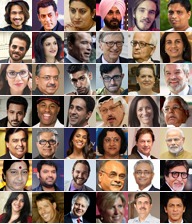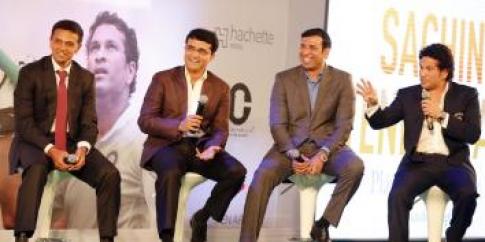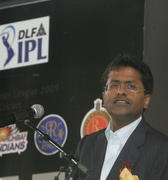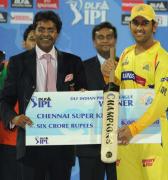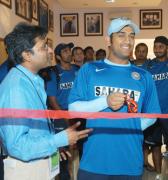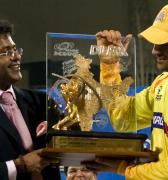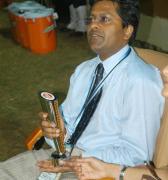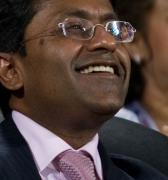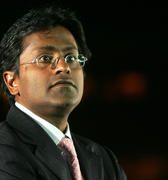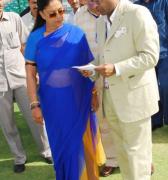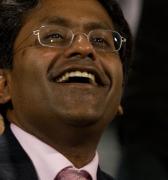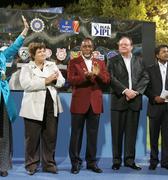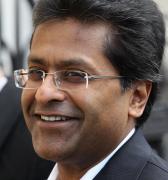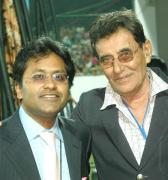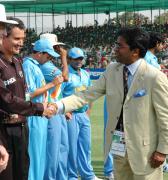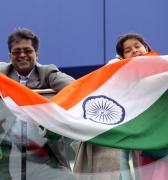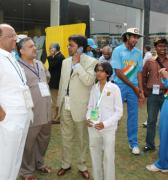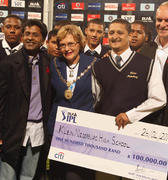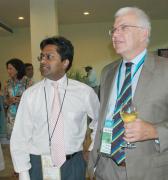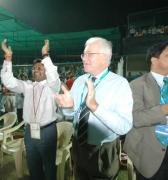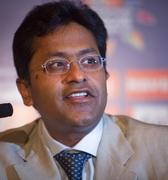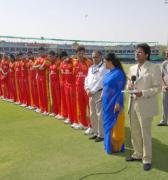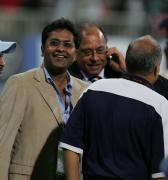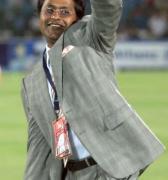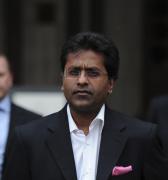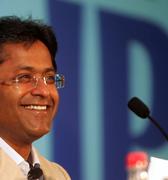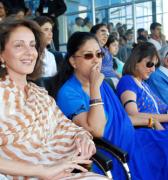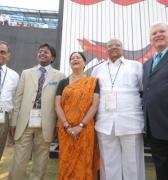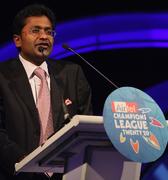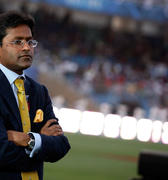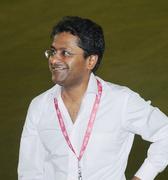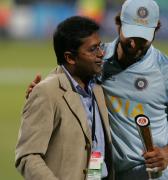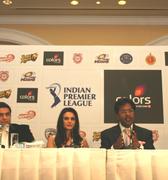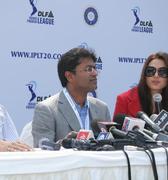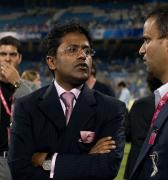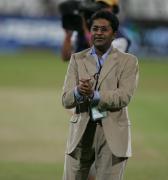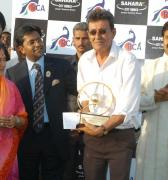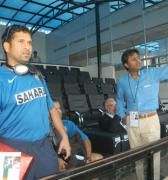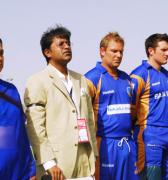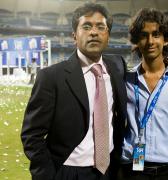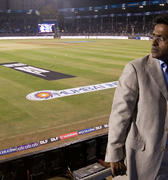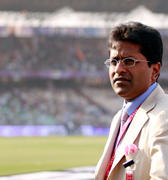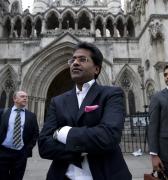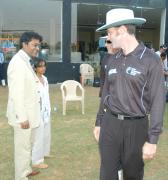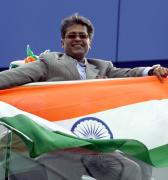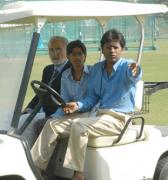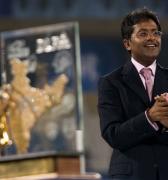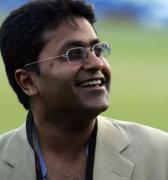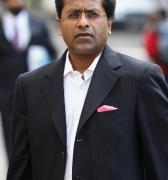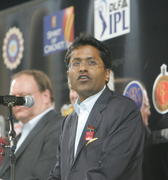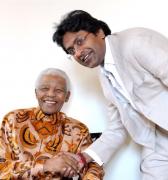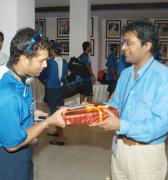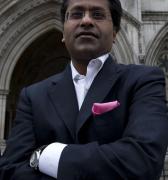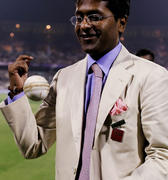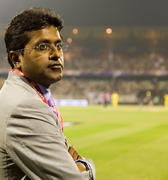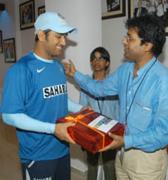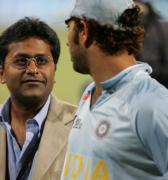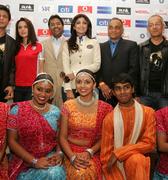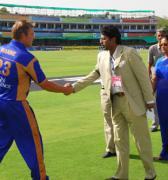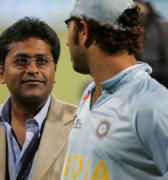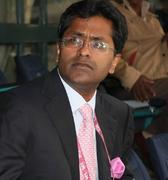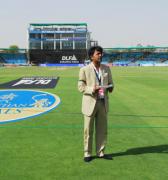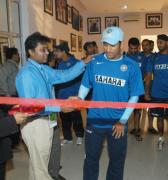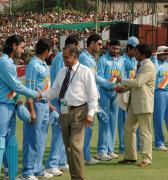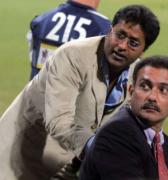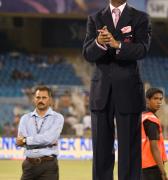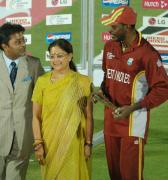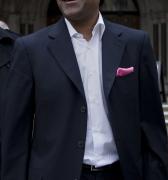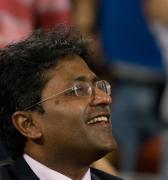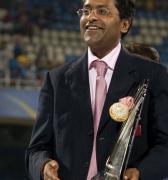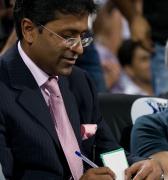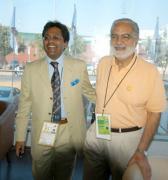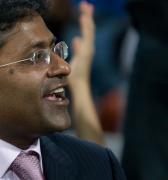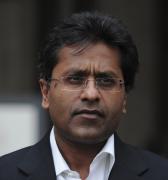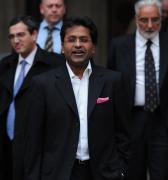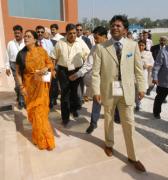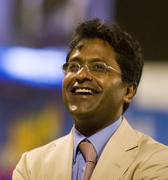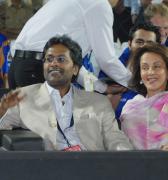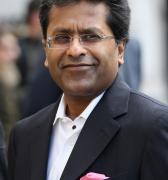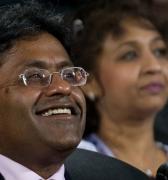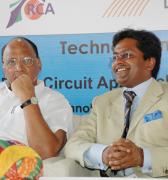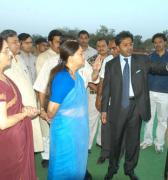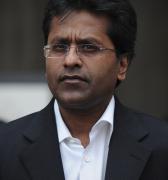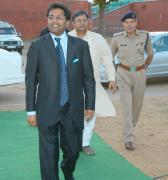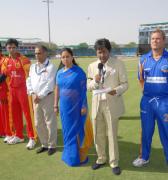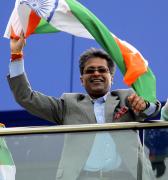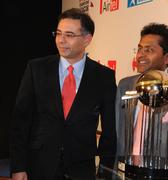The many BCCIs and their many problems
There has been very little clarity around the situation that has led from Anil Kumble's sacking as India coach to Ravi Shastri's appointment to the position, suggesting the BCCI is still averse to transparency
Hours before the cricket advisory committee (CAC) arrived at a decision, one TV channel jumped the gun and announced Ravi Shastri as the new India coach. At that point, the BCCI was in a meeting at Taj Mahal hotel in central Delhi. This meeting - originally called to find some sort of consensus on adopting parts of the Lodha Committee reforms - had lost all value once a few state associations decided to boycott in protest. It was just a glorified tea party now.
When the "news" broke, phones started ringing inside the meeting, letting the BCCI know that the BCCI had announced a new coach. In a different scenario, the BCCI might have taken this seriously, even issued a rejoinder perhaps, but on Tuesday, one member inside the meeting room joked, "Kaunsi wali BCCI ne announce kiya [Which BCCI made the announcement]?" And, as they sipped on their tea, everybody laughed.
Had this not been real, it could have been a scene straight of Jaane Bhi Do Yaaro, the legendary film and razor-sharp satire on Indian politics and power. The camera zooms out, the laughter slowly fades away, and the next scene begins with the narrator asking: "Which BCCI indeed?"
The BCCI of its CEO Rahul Johri, who was caught napping or chose to sleep as the trouble between Virat Kohli and Anil Kumble kept on brewing? The BCCI of the Committee of Administrators (CoA), who can choose to ignore problems by arguing their mandate is to impose reforms, and can pick and choose issues to meddle in? The BCCI of acting secretary Amitabh Choudhary, who couldn't see any smoke when the house that Kumble built was being burnt down? The BCCI of the Cricket Advisory Committee (CAC), which is riddled with conflicts of interests, granted an ambiguous power to recommend a coach but with no responsibility to try to make it work? Or the BCCI of Kohli, whose wish finally prevailed in getting Shastri as the coach?
Whichever version it might be, the BCCI has slowly slipped back to having no accountability, doing away with press conferences to announce squads or coaches, and dealing in releases as clear as the water that collects on Indian roads during the monsoon.
For example, in its official world, the BCCI still wants everyone to believe that it was Kumble who decided to leave even when the CAC had "endorsed" an extension for him, as its release dated June 20 and titled "Anil Kumble withdraws" says. What it won't tell you is that the extension was only for the West Indies tour, and even that was yet to be accepted by the BCCI, and more importantly, Kohli. In other words, they tried to say Kumble was leaving and they were helpless, whereas, in fact, Kumble jumped before he would have been pushed.
No one in the CAC thought it fit to clarify. This is the committee that couldn't find the time, will or wherewithal to sit alone with Kumble and Kohli during the Champions Trophy: just the cricketers sitting down and trying to resolve an issue between a coach that three legends had subverted process to appoint less than a year ago, and a captain they have faith in. Through the whole fiasco, there was not one meeting between just the five of Kohli, Kumble, Sachin Tendulkar, Sourav Ganguly and VVS Laxman.
You live, you learn, you'd think. Perhaps the lesson was learnt. The same CAC now wanted to sit down with Kohli and tell him, in the words of one of its members Ganguly, that he "needs to understand how coaches also operate". Perhaps someone in the committee wanted to let Kohli know he wasn't being granted his wish because he can't so openly choose the coach; a wish that one of the aforementioned BCCIs had already started fulfilling by extending the deadline for applications.
This, according to the board, was being done to encourage those who didn't apply because of Kumble's presence in the process because he seemed certain to get another go. A more laughable reason could not be possible; everybody knew Kumble was not going to continue from the day the BCCI began the smear campaign against him through selective leaks.
Be that as it may, it seemed the CAC now was going the independent way. Ganguly suggested, a day before the eventual announcement, that there was disagreement over the coach, and that they needed time to thrash it out with Kohli, that there was still time, and that they were happy to wait for Kohli to come back from his holiday and make up their collective minds. And then suddenly, the CoA got into action, and asked the board - as various officials confirmed - to announce the coach "as soon as possible".
Why didn't the CoA react with similar alacrity to the issues that Ramachandra Guha, a former member, kept raising? Why is the CoA not consistent about what its priorities are? What was the blinding hurry, as if in a pre-GST discount sale, to get a new coach? Or was it that a member of the CAC sought help from the CoA because he feared his favoured candidate could miss out if time passed?
And how obediently have the BCCI and CAC listened to this order from the CoA, even though their other directives regarding reforms have been brazenly ignored. In the end, the pre-fixed result was arrived at. But, like parents who might let their stubborn little one on an adventure ride provided they had adult supervision, the CAC went ahead and appointed two more men as support staff, two men they played their cricket with.
Since when did it become the mandate of the CAC to choose the new coach's support staff? If the CAC was going to choose, would it not have been ideal to invite applications for the bowling coach? You wonder what responsibility Shastri is left with now, apart from what Kohli likes him for. An unwritten convention is to give the coach the first right to recommend the support he wants to work with, so that you know in no unclear terms who is at the wheel. So many superstars in one leadership team - and a big one at that - is recipe for disaster. The CoA has patted the CAC on its back instead of asking them why there was no process followed in selecting the support staff.
Since we began with political satire, it is only fair we go back to the greatest political satire written in India, Raag Darbari. In this novel, a records clerk and a villager fail to agree on the amount that should be the bribe for a document the villager needs. Personal insults follow. Eventually the clerk turns all honest, "Now I don't need a bribe. Whatever has to happen will happen through the due process." The villager ultimately never gets that document because nobody other than the clerk knows the process.
In the village of Indian cricket, "process" is a similar well that those inside draw from. If Kumble has to be appointed to keep Shastri out, it is done through a process. If Kumble has to be kicked out, the BCCI does it through a process. When the captain is asked about it, he hides behind a process, knowing well that his previous coach Duncan Fletcher got an extension without a process. If a pre-fixed coach has to be appointed, the BCCI alters the process. If the team loses on the field, it focuses on the process and not the result. Not wanting to follow the Supreme Court order too is a process. In the process the BCCI has even out-processed the CoA, one of whom has dabbled successfully in Indian bureaucracy, where all processes come to worship.
Hours before the cricket advisory committee (CAC) arrived at a decision, one TV channel jumped the gun and announced Ravi Shastri as the new India coach. At that point, the BCCI was in a meeting at Taj Mahal hotel in central Delhi. This meeting - originally called to find some sort of consensus on adopting parts of the Lodha Committee reforms - had lost all value once a few state associations decided to boycott in protest. It was just a glorified tea party now.
When the "news" broke, phones started ringing inside the meeting, letting the BCCI know that the BCCI had announced a new coach. In a different scenario, the BCCI might have taken this seriously, even issued a rejoinder perhaps, but on Tuesday, one member inside the meeting room joked, "Kaunsi wali BCCI ne announce kiya [Which BCCI made the announcement]?" And, as they sipped on their tea, everybody laughed.
Had this not been real, it could have been a scene straight of Jaane Bhi Do Yaaro, the legendary film and razor-sharp satire on Indian politics and power. The camera zooms out, the laughter slowly fades away, and the next scene begins with the narrator asking: "Which BCCI indeed?"
The BCCI of its CEO Rahul Johri, who was caught napping or chose to sleep as the trouble between Virat Kohli and Anil Kumble kept on brewing? The BCCI of the Committee of Administrators (CoA), who can choose to ignore problems by arguing their mandate is to impose reforms, and can pick and choose issues to meddle in? The BCCI of acting secretary Amitabh Choudhary, who couldn't see any smoke when the house that Kumble built was being burnt down? The BCCI of the Cricket Advisory Committee (CAC), which is riddled with conflicts of interests, granted an ambiguous power to recommend a coach but with no responsibility to try to make it work? Or the BCCI of Kohli, whose wish finally prevailed in getting Shastri as the coach?
Whichever version it might be, the BCCI has slowly slipped back to having no accountability, doing away with press conferences to announce squads or coaches, and dealing in releases as clear as the water that collects on Indian roads during the monsoon.
For example, in its official world, the BCCI still wants everyone to believe that it was Kumble who decided to leave even when the CAC had "endorsed" an extension for him, as its release dated June 20 and titled "Anil Kumble withdraws" says. What it won't tell you is that the extension was only for the West Indies tour, and even that was yet to be accepted by the BCCI, and more importantly, Kohli. In other words, they tried to say Kumble was leaving and they were helpless, whereas, in fact, Kumble jumped before he would have been pushed.
No one in the CAC thought it fit to clarify. This is the committee that couldn't find the time, will or wherewithal to sit alone with Kumble and Kohli during the Champions Trophy: just the cricketers sitting down and trying to resolve an issue between a coach that three legends had subverted process to appoint less than a year ago, and a captain they have faith in. Through the whole fiasco, there was not one meeting between just the five of Kohli, Kumble, Sachin Tendulkar, Sourav Ganguly and VVS Laxman.
You live, you learn, you'd think. Perhaps the lesson was learnt. The same CAC now wanted to sit down with Kohli and tell him, in the words of one of its members Ganguly, that he "needs to understand how coaches also operate". Perhaps someone in the committee wanted to let Kohli know he wasn't being granted his wish because he can't so openly choose the coach; a wish that one of the aforementioned BCCIs had already started fulfilling by extending the deadline for applications.
This, according to the board, was being done to encourage those who didn't apply because of Kumble's presence in the process because he seemed certain to get another go. A more laughable reason could not be possible; everybody knew Kumble was not going to continue from the day the BCCI began the smear campaign against him through selective leaks.
Be that as it may, it seemed the CAC now was going the independent way. Ganguly suggested, a day before the eventual announcement, that there was disagreement over the coach, and that they needed time to thrash it out with Kohli, that there was still time, and that they were happy to wait for Kohli to come back from his holiday and make up their collective minds. And then suddenly, the CoA got into action, and asked the board - as various officials confirmed - to announce the coach "as soon as possible".
Why didn't the CoA react with similar alacrity to the issues that Ramachandra Guha, a former member, kept raising? Why is the CoA not consistent about what its priorities are? What was the blinding hurry, as if in a pre-GST discount sale, to get a new coach? Or was it that a member of the CAC sought help from the CoA because he feared his favoured candidate could miss out if time passed?
And how obediently have the BCCI and CAC listened to this order from the CoA, even though their other directives regarding reforms have been brazenly ignored. In the end, the pre-fixed result was arrived at. But, like parents who might let their stubborn little one on an adventure ride provided they had adult supervision, the CAC went ahead and appointed two more men as support staff, two men they played their cricket with.
Since when did it become the mandate of the CAC to choose the new coach's support staff? If the CAC was going to choose, would it not have been ideal to invite applications for the bowling coach? You wonder what responsibility Shastri is left with now, apart from what Kohli likes him for. An unwritten convention is to give the coach the first right to recommend the support he wants to work with, so that you know in no unclear terms who is at the wheel. So many superstars in one leadership team - and a big one at that - is recipe for disaster. The CoA has patted the CAC on its back instead of asking them why there was no process followed in selecting the support staff.
Since we began with political satire, it is only fair we go back to the greatest political satire written in India, Raag Darbari. In this novel, a records clerk and a villager fail to agree on the amount that should be the bribe for a document the villager needs. Personal insults follow. Eventually the clerk turns all honest, "Now I don't need a bribe.
Whatever has to happen will happen through the due process." The villager ultimately never gets that document because nobody other than the clerk knows the process.
In the village of Indian cricket, "process" is a similar well that those inside draw from. If Kumble has to be appointed to keep Shastri out, it is done through a process. If Kumble has to be kicked out, the BCCI does it through a process.
When the captain is asked about it, he hides behind a process, knowing well that his previous coach Duncan Fletcher got an extension without a process. If a pre-fixed coach has to be appointed, the BCCI alters the process. If the team loses on the field, it focuses on the process and not the result. Not wanting to follow the Supreme Court order too is a process. In the process the BCCI has even out-processed the CoA, one of whom has dabbled successfully in Indian bureaucracy, where all processes come to worship.
(Courtesy: ESPNCricinfo)




